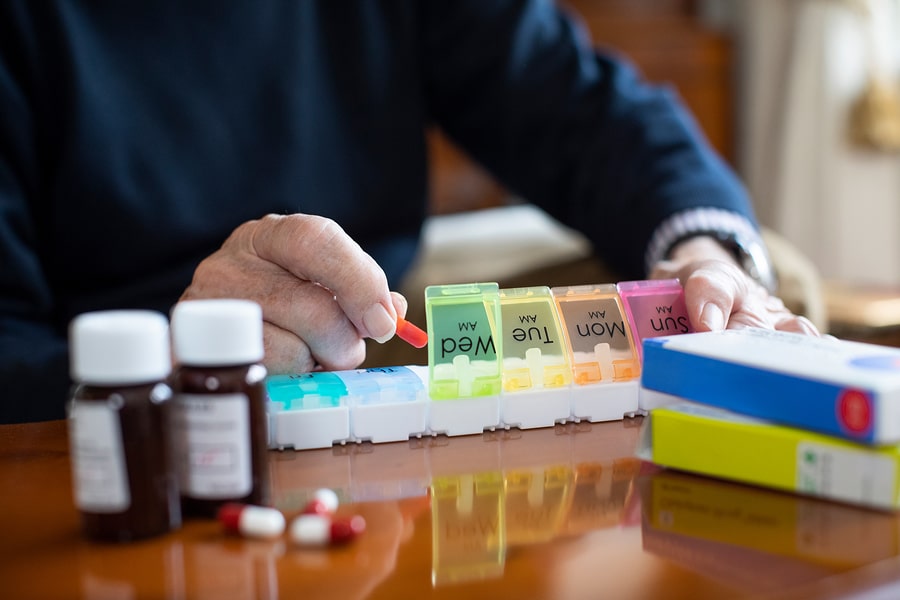
Some people assume that over-the-counter drugs, otherwise known as OTC drugs, are harmless—even when taken in large quantities. Nothing could be further from the truth. When people abuse OTC drugs, serious health complications—even death—can result.
When individuals take OTC medications in the manner directed, these drugs are usually harmless. However, problems can arise when a person combines an OTC medication with other drugs, including prescription medications. This practice can lead to various side effects.
In some instances, new OTC drugs are not properly tested before they are put on the market, and users come to find out that the drugs have previously unknown side effects or other complications associated with them. Other drugs are properly tested before going on the market, but they do not have the necessary warnings on the drug packaging materials to inform a consumer of the potential risks and side effects associated with using the drug.
If you or someone you love has suffered an illness or injury that you believe was caused by a defective OTC drug or another type of drug, a defective drug lawyer may be able to help. A personal injury lawyer can consult with the necessary experts to determine whether a defect in the medication exists. If so, a lawyer may be able to help you recover compensation for your experience with the defective drug, and any unexpected side effects it had on you.
Potential Complications With Acetaminophen
Acetaminophen is a drug that is primarily associated with relief of mild discomfort or pain. It is typically found in common over-the-counter medications like Midol, Tylenol, and Excedrin, as well as in some medications that are used to treat common cold or flu symptoms.
Problems often arise when users take too much acetaminophen in a single dose, or when they take a drug that contains acetaminophen, such as Tylenol, along with a cold medication numerous times throughout the course of a day.
In general, a person’s daily dose of acetaminophen should be limited to between 2,000 and 3,000 milligrams per day. This is the equivalent of taking a total of six tablets of extra-strength Tylenol.
One of the most common complications associated with excessive acetaminophen use is liver damage. Even in cases where a user takes low doses of acetaminophen each day over the course of several days, there can be damage to liver cells. In the worst-case scenario, overdosing on acetaminophen can result in toxic and fatal liver damage, caused by liver cells rapidly dying off. This level of toxicity can also be reached quickly by combining an acetaminophen drug with alcohol usage.
To treat toxic liver damage, a liver transplant is often required. Some common symptoms that are associated with toxic liver damage include extreme fatigue, pain in the abdomen, vomiting, nausea, jaundice (i.e. yellow skin or eyes), or a lack of appetite.
If you believe that you or someone you love may have overdosed on acetaminophen, you should seek medical attention right away.
Potential Problems With Nonsteroidal Anti-inflammatory Drugs
Nonsteroidal anti-inflammatory drugs are commonly known as NSAIDs. These over-the-counter medications are typically used to reduce inflammation od/or to relieve pain. Individuals who suffer from chronic conditions like arthritis commonly use NSAIDs. Common over-the-counter NSAIDs include Motrin, Advil, Naproxen, Naprosyn, and Aleve, and these drugs contain ibuprofen (which can also be found in common cold and flu medications that are also OTC drugs).
Experts recommend that when it comes to NSAID drugs, users should not take more than 1,200 milligrams in a 24-hour time period. Moreover, these types of drugs should not be taken on a daily basis. In fact, these OTC drugs can cause users serious problems if they continue to use them over an extended period of time.
Some of the most common problems that are associated with excessive NSAID use include the following:
- Ringing noises in the ears
- Hypertension
- Kidney damage
- Increased risk of heart attack and stroke
- Increased risk of stomach bleeding or stomach ulcers
Potential Problems With Long-Term Aspirin Use
On one hand, taking aspirin can help when it comes to preventing strokes and heart attacks. However, taking aspirin over long periods of time can also present numerous problems.
Some of the most common health problems that are associated with excessive aspirin use include the following:
- Acute kidney failure
- A stroke brought on by a burst blood vessel
- Bleeding in the gastrointestinal region
- Ringing in the ears and, in some cases, a total hearing loss
- An allergic reaction that can lead to asthma or may worsen asthma in users who already suffer from the condition
Steps to Take Before Buying and Consuming an OTC
Due to the heavy side effects associated with common OTC drugs, not to mention the harmful drug interactions that can result from taking multiple medications at the same time, there are certain steps that you should always take before buying (and consuming) an OTC. First, you should always check the ingredients that are used to make the drug and see if there are any warnings on the drug label—such as a warning not to take the OTC with a specific type of other OTC or prescription medication. In these cases, certain OTC medications cannot be mixed and matched with other OTC medications, or with certain prescription medications, without causing harmful side effects.
In addition to making sure that you read the drug ingredients and all warning labels present on the OTC drug package, you should also read and understand the drug directions. Make sure to follow all of the directions on the packaging materials and, if you have any questions, receive clarification from a qualified medical professional, such as a doctor or pharmacist. You should never take more than the daily-recommended dosage that is listed on the drug packaging materials.
Also, generally speaking, you should never take an OTC medication, such as a pain reliever, for more than ten days. If ten days have gone by and you are still experiencing pain or other symptoms, you should contact your doctor about what you should do next and the steps that you need to take.
When Are OTC Drugs Defective?
New drugs are released into the market on a near daily basis. Sometimes, when these drugs (including OTC drugs) are released for purchase by consumers, they have side effects associated with them that were previously unknown to researchers. These side effects can sometimes be extremely dangerous (or even fatal) for potential users. OTC drugs are also considered defective when necessary warnings are absent from the label, or do not sufficiently warn consumers about potential complications and side effects associated with using the OTC drug.
Proving that an OTC drug or other drug is defective can be a difficult task.
To succeed in a claim against a pharmaceutical company, you must demonstrate:
- That the drug at issue was defective in some way
- That you were not sufficiently notified or warned about the defect or defects (such as negative side effects) associated with using the drug
If you believe that you or someone you love has been harmed by using a defective OTC drug, an experienced defective drug lawyer can evaluate your case and may be able to assist you with proving it against the manufacturing company that produced the drug at issue.
Making a Claim for Injuries Caused by a Defective Drug
Pharmaceutical and big drug companies owe a duty to their consumers to make sure the OTC drugs they put on the market are properly tested and safe. When consuming an OTC drug results in one or more unexpected side effects, then the pharmaceutical company can be liable for any injuries and damages that result. After all, these companies have an obligation under the law to provide medications to the public that are both safe and effective. Therefore, they have a duty to make sure that their products have been properly tested and researched before being placed on the market.
In some instances, when new drugs, including OTC drugs, cause unexpected side effects, the government or manufacturer may recall the dangerous drug. The purpose of a drug recall is to try and remove the dangerous OTC medication that had prematurely been put on the market. In the majority of drug recall cases, it is the United States Food and Drug Administration—otherwise known as the FDA—who issues the drug recall.
Even if a dangerous OTC drug is recalled from the market, the damage may have already been done. In other words, you or some other consumer may have purchased the drug, taken it, and experienced irreversible side effects or health problems. Therefore, even in cases where the FDA has issued a drug recall, you may still be eligible to make a legal claim against the pharmaceutical company that manufactured the drug, due to the injuries or health problems that you suffered.
Moreover, if you have a loved one who passed away as a result of consuming a defective OTC drug, you may be able to assert a wrongful death claim against the pharmaceutical company and pursue wrongful death damages on behalf of the deceased loved one.
How to Build Your Claim Against the Pharmaceutical Company That Manufactured the Defective Drug
Building a successful defective drug case against a large pharmaceutical company can be an extremely complicated task. Therefore, if you decide to pursue such a claim, you want to make sure that you have an experienced defective drug lawyer on your side, assisting you throughout the entire process. In particular, you want to make sure that you have a lawyer who has handled numerous defective drug cases in the past.
To be successful, you will need to show not only that the OTC drug was defective, but that you were injured as a result—and that the resulting medical illness or injury causally stems from consuming the defective drug.
To prove your case, you will need to make sure that documentation in your possession shows that you (or your deceased loved one, in the case of a wrongful death case) took the drug at issue. Since many pharmacies keep records pertaining to medications that their customers were prescribed, documentation from the pharmacy may be necessary for you to show that you were prescribed—and that you took—a particular defective drug. If you purchased the drug over the counter, you should save all receipts and keep track of all credit card statements that show that you purchased the drug in question.
If you wish to file a claim or lawsuit against the pharmaceutical company, you must do so promptly. When it comes to defective drug cases, statutes of limitation vary by jurisdiction, but in many states, the limitations period is only two years. In some jurisdictions, that time period is even less. Therefore, if you are thinking about filing a claim and trying to build a defective drug case against a pharmaceutical company, you should notify an experienced defective drug lawyer right away to begin an investigation.
If you have become injured or ill as a result of taking a defective OTC drug or other defective medication, you have rights under the law. Moreover, you may be entitled to pursue and recover monetary compensation for all of your related medical expenses, lost wage earnings, as well as pain and suffering you experienced as a result.
A knowledgeable defective drug attorney will be able to engage in investigative research concerning your potential claim, and determine if you may be eligible to recover damages. If so, contact a lawyer who can file a claim against the pharmaceutical company on your behalf and help you pursue the monetary recovery you deserve—either by way of a settlement, jury trial, or alternative dispute resolution.


